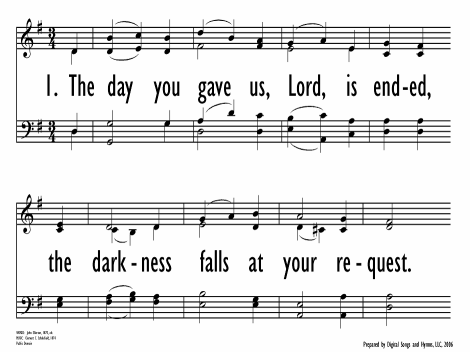- |
User Links
387
The Day You Gave Us, Lord, Is Ended
Hymn Information
- First Line
- The day you gave us, Lord, is ended
- Author
- John Ellerton (1870, alt.)
- Tune Name
- ST. CLEMENT
- Composer
- Clement C. Scholefield (1874)
- Topic
- Daily Prayer: Evening · Time
Copyright Information
- Text Copyright
- Public Domain
- Tune Copyright
- Public Domain
- Reprint/Projection Information
- Words and Music: The Words and Music are in the Public Domain; you do not need permission to project or reprint the Words and Music.
Full Text
Scripture References
Confessions and Statements of Faith References
Further Reflections on Confessions and Statements of Faith References
The beautiful contrast in this song is that while our day is ending and we soon rest in sleep, the church of Christ continues through each time zone, with no stopping for rest. And so the voice of prayer and praise continues. Heidelberg Catechism, Lord’s Day 21, Question and Answer 54 teaches that the holy catholic church is found among the entire human race, “dispersed throughout the entire world” (Belgic Confession, Article 27).
387
The Day You Gave Us, Lord, Is Ended
Tune Information
- Name
- ST. CLEMENT
- Key
- G Major
- Meter
- 9.8.9.8
Recordings
387
The Day You Gave Us, Lord, Is Ended
Hymn Story/Background
John Ellerton wrote this evening hymn (and 319) in 1870 for A Liturgy for Missionary Meetings. The text's dominant theme is the growing worldwide fellowship of the Christian church and its unbroken, unceasing offering of praise and prayer to God.
Ellerton borrowed the hymn's first line from an anonymous text in Church Poetry (1843). He then revised his text for the hymn's publication in the Society for the Promotion of Christian Knowledge's Church Hymns (1871), of which he was coeditor. Possibly prompted by the suitability of the worldwide church image as a symbol for the British Empire "on which the sun never sets," Queen Victoria chose this hymn to celebrate her Diamond Jubilee in 1897. Victoria's use of the hymn assured its popularity in the English-speaking world. Even though Victoria may have chosen the hymn to symbolize the British Empire, stanza 4 wisely reminds us that earthly kingdoms pass away—only the kingdom of God stands and grows forever.
ST. CLEMENT was composed for this text by Rev. Clement C. Scholefield. ST. CLEMENT was published in Arthur S. Sullivan's 1874 hymnal, Church Hymns with Tunes; of his own accord Sullivan "canonized" his curate, Scholefield, by naming this tune ST. CLEMENT.
Although some people object to the waltz-like rhythms of ST. CLEMENT, most love the melody with its slurred tones. Sing with solid organ support or accompaniment. For the fourth stanza, the organist could slow down slightly and add the most brilliant mixture and reeds available.
—
Bert Polman
Author Information
Educated at King William's College on the Isle of Man and at Trinity College, Cambridge, England, John Ellerton (b. London, England, 1826; d. Torquay, Devonshire, England, 1893) was ordained in the Church of England in 1851. He served six parishes, spending the longest time in Crewe Green (1860-1872), a church of steelworkers and farmers. Ellerton wrote and translated about eighty hymns, many of which are still sung today. He helped to compile Church Hymns and wrote its handbook, Notes and Illustrations to Church Hymns (1882). Some of his other hymn texts were published in The London Mission Hymn Book (1884).
—
Bert Polman
Composer Information
Educated at St. John's College, Cambridge, Rev. Clement C. Scholefield (b. Edgbaston, near Birmingham, Warwickshire, England, 1839; d. Goldalming, Surrey, England, 1904 was ordained in the Church of England in 1867. He served at Hove, Brighton, St. Peter's in Kensington (1869-1879), and briefly at St. Luke's in Chelsea. From 1880 to 1890 he was chaplain at Eton College and from 1890 to 1895 vicar of Holy Trinity in Knightsbridge. Mainly self-taught as a musician, Scholefield became an accomplished pianist and composed some songs and hymn tunes, of which ST. CLEMENT is the only one in common use today; it is always joined to Ellerton's text.
—
Bert Polman
Suggestions or corrections? Contact us


 My Starred Hymns
My Starred Hymns





